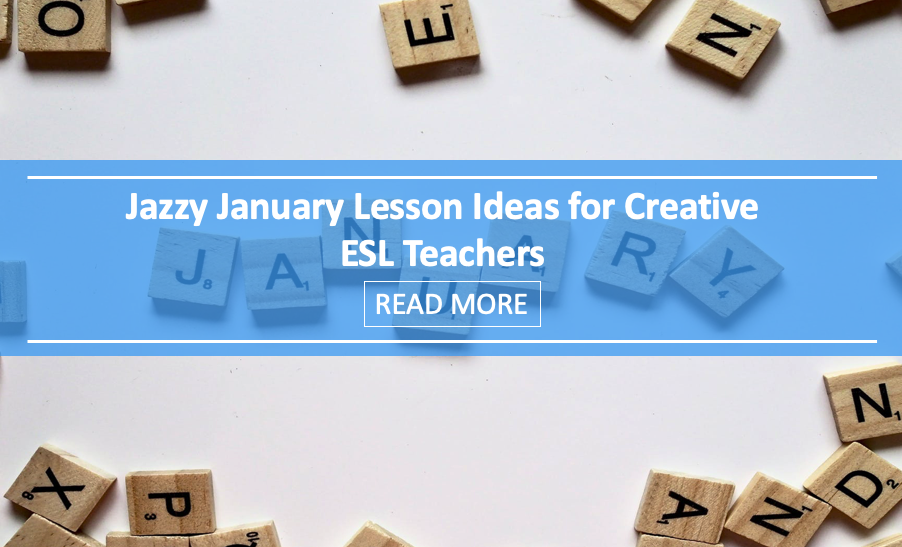Jazzy January Lesson Ideas For Creative ESL Teachers

When it’s time to change the calendars in your classroom, try one of the following January themed activities. You will be keeping with the times while keeping focused on your students’ language improvement.

It’s traditional on New Year’s Day to decide on one or more New Year’s resolutions. Ask your students to think about the goals they would like to accomplish in the New Year, then explain how we often talk about resolutions at the start of each January. After your students have had some time to think about their hopes for the coming year, match students with a partner to talk about their resolutions. Depending on the level of your students, you might want them to share their plans using the simple future tense or using the conditional tense to talk about things they would like to see happen this year.
On January 3, 1888, Marvin Stone patented the simple drinking straw that would soon impact beverage consumption all over the world. And though most straws come with a tasty beverage, straws can be used for more than just quenching your thirst. (Just ask any fan of the spit ball.) Challenge your students to think creatively and compile a list of all possible uses for drinking straws. Groups of three work well for this activity. Once students have exhausted their ideas, have them share their lists with the rest of the class.
In some areas of the world, January is infamous for its cold weather and snow. Gather some pictures of children playing in the snow for this speaking activity. Have your students use one of these snowy fun pictures as inspiration for a story. In their stories, students should describe what the young people are doing in their picture and fit that activity into their overall stories.
Cold weather can be very dangerous for those who do not know the proper survival techniques. Have your students work with a partner to do some internet research on how to survive in plunging temperatures. Then have the pairs prepare a three to five minute presentation instructing their classmates how to properly survive a very chilly situation. This is also a good opportunity to review and use modal verbs (can, should, could).
For a simple vocabulary generating activity, brainstorm with your class items that are white like snow. Try to get as many items on your class list as possible, and stop and explain new words as your students offer them. You might want to consider allowing bilingual dictionaries for this activity depending on the level of your students.
January 15this national hat day. Let the silly come out in your students as they draw a picture of a crazy hat they would like to wear. Once their pictures are complete, students should write a paragraph on the origin of their crazy hat. Did they design it themselves? Did they see someone else wear it? Display the pictures with their paragraphs on a bulletin board titled “Hats Off to Hats” so students can read them during free learning periods. You might also want to have a crazy hat day in your classroom as well!
January 5this National Bird Day, and what better excuse do you need to give our feathered friends some attention. Familiarize your students with the hobby birding (previously known as bird watching). Then take your class outside to do some birding of their own. (If you live in a colder area of the world, you might prefer letting your students read about birds at your school library.) After your nature walk, put students in groups of around three or four to discuss what they saw as they walked in the wild. Use these conversations as a chance to talk about different varieties of birds in your area, in your students’ homes, and those that are popular as pets. If you like, have your students do some research on a particular variety of bird and share the information they find in a five minute oral report.
The first week of January is Universal Letter Writing Week. Are letters important to your students? Would they rather communicate in more technologically advanced ways? Spend some time the first week of the year reviewing with your students how to write a personal letter, and then follow up by setting aside some time every day to write a letter to someone important. You might want to choose a different theme for each letter: a love letter, a letter to a political leader, a letter to someone in the class, etc.
The third week of January is Pizza Week. What do your students like on their pizzas? Have groups of three or four discuss the ideal pizza. Then have the groups work together to plan their own pizza restaurant. Groups should decide on five specialized pizzas their restaurant will offer, decide on a name for their restaurant, and write a sample menu. Depending on the level of your students, have them discuss their restaurant using the simple future or the conditional tense. Finish off the activity with a pizza party, of course!
Celebrate the winter by making “snowball” sculptures using mini marshmallows and tooth picks (tinker toy style). One everyone has finished their sculptures, put them on display for the class to admire. Students should make guesses at what each sculpture is supposed to be. Have them write their guesses on small slips of paper or index cards and place them face down in front of each sculpture. Finally, have each student present his sculpture to the class and explain what it is. To the member of your class who make the most correct predictions, give a prize – the leftover marshmallows, of course!
What are your favorite language building activities to do in January?